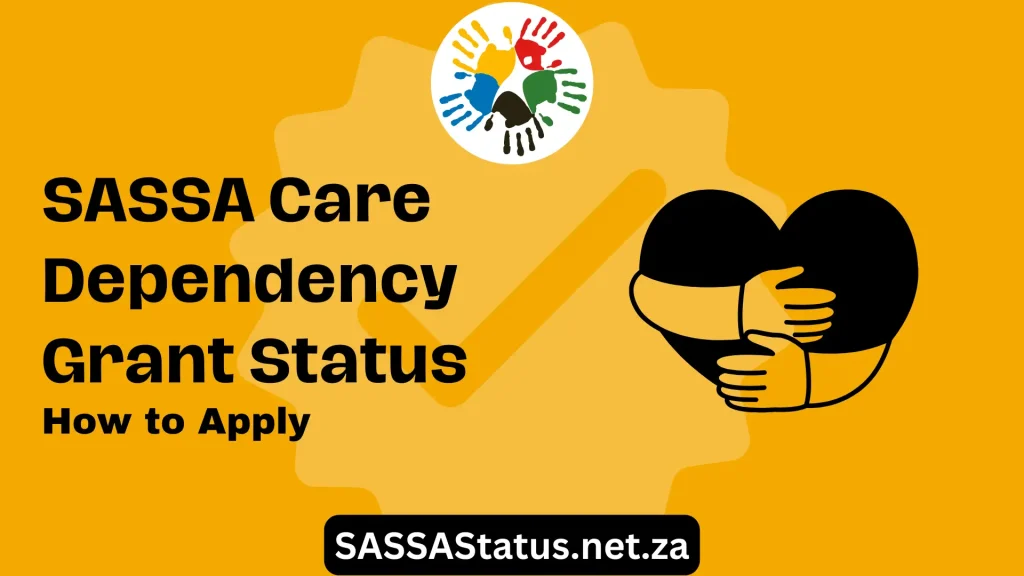SASSA Care Dependency Grant Status – How to Apply
The Care Dependency Grant (CDG) is a program run by the federal government for kids under 18. It gives them money every month based on their needs. SASSA, the organization that handles CDG, makes sure that children who qualify, especially those with disabilities, get the support they need.

The care dependency grant is designed to assist caregivers in providing full-time and specialized care for children with severe disabilities. To understand if you qualify for this grant, let’s dive into the eligibility criteria, application process, payment methods, and important considerations regarding reviews, suspensions, and lapses of the grant.
How Do You Know If You Qualify?
To determine eligibility for the care dependency grant, certain criteria must be met:
The eligibility criteria for the grant are as follows:
It is important to note that approval of the grant requires assessment by a state medical officer.
How Will Care Dependency Grant Pay You?
The SASSA offers various methods for grant payment:
If you are unable to collect the grant personally, you have the option to appoint a procurator at the SASSA office or grant power of attorney to someone to collect it on your behalf.
When May the Child’s Grant Be Reviewed?
SASSA reserves the right to initiate a review of your child’s grant. This assessment is based on the income information provided during the application process. Notification of the review date or the deadline for submitting a life certificate, typically three months in advance, will be sent to you. If you receive grant payments via a bank, institution, or procurator, you must annually complete a life certificate at the SASSA offices to verify your continued eligibility.
When May the Child’s Grant Be Suspended?
The child’s grant may be suspended under several circumstances:
Changes in the Child’s Circumstances
If there are significant alterations in the child’s situation or needs, the grant may be suspended to reassess the appropriate level of support required.
Review Outcomes
Following a review of the grant, if findings indicate a need for adjustments or revaluation, the grant may be suspended temporarily until the review process is completed.
Non-cooperation During Reviews
Failure to cooperate during grant reviews can lead to suspension. Cooperation is essential for accurately assessing the child’s ongoing needs and ensuring appropriate support.
Fraudulent Activities or Misrepresentation
Instances of fraud or misrepresentation regarding the child’s circumstances or needs can result in the suspension of the grant. It is because such actions undermine the integrity of the support system.
Errors in grant approval
If errors are discovered in the initial approval of the grant. In that case, suspension may occur while the errors are rectified to ensure that the support provided aligns with the child’s actual needs.
When Will Your Grant Lapse?
The grant will expire under the following circumstances:
What You Should Do?
To apply for assistance at the South African Social Security Agency (SASSA) office, you’ll need to:
SASSA will refer the child for a state medical officer’s assessment before processing the application.
What if Your Application is Not Approved?
- If your application is not approved, SASSA will inform you in writing of the reasons for the decision.
- Should you disagree, you have the option to appeal to the Minister of Social Development.
- The appeal must be lodged within 90 days of notification of your application’s rejection.
- Your appeal should include a clear explanation of why you contest the decision.
- How long does it take?
Processing times for your application can extend up to three months. Additionally, there are no costs associated with this service; it is entirely free of charge.
Conclusion
The Care Dependency Grant serves as a vital support system for caregivers of children with severe disabilities in South Africa. It offers financial assistance to ensure these children receive the specialized care they require. Eligibility is determined based on various factors, including income and the child’s disability status.
While the application process involves gathering specific documents and undergoing assessments, the support provided by the grant can significantly alleviate the financial burden on caregivers. Regular reviews and adherence to guidelines are essential to maintain eligibility and ensure continued assistance for the child’s well-being.
Contact SASSA for More Queries
If you’re still confused and have more queries related to your status, then do contact SASSA through verified channels: